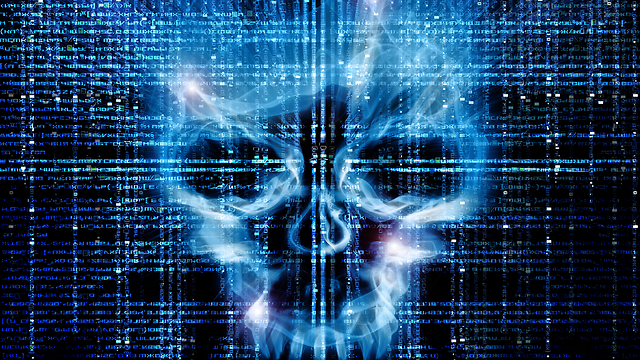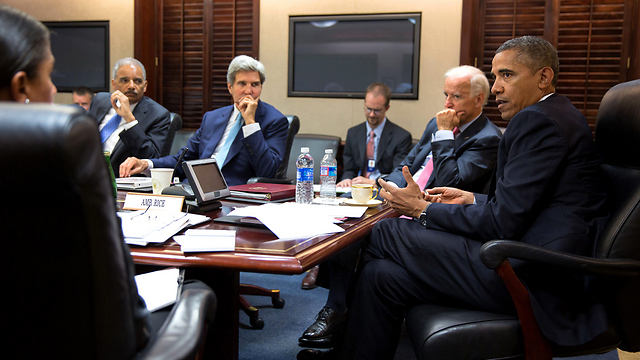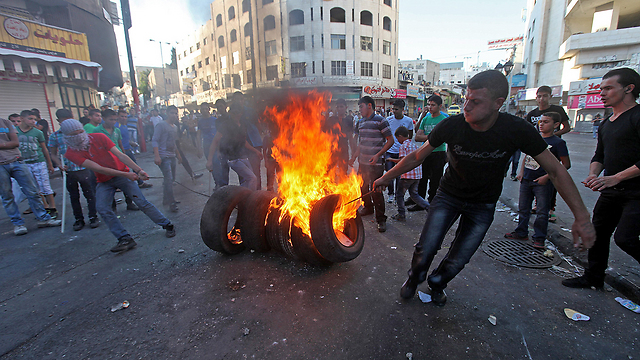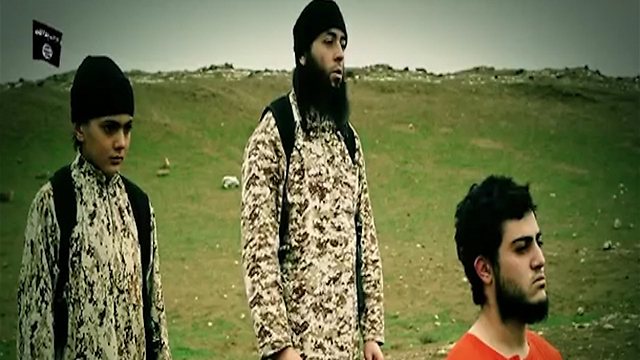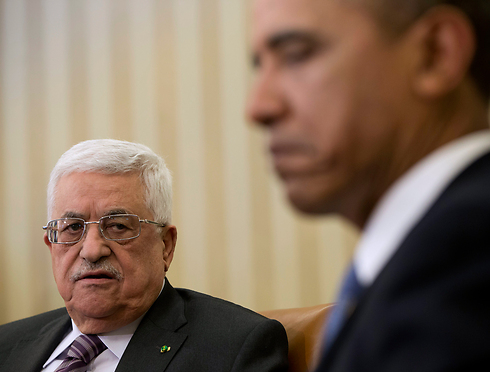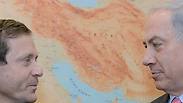
The next prime minister's real security challenge
Analysis: In order to successfully deal with the serious threats Israel is facing, some of which may materialize as early as this year, the winner of the 2015 elections must be capable of reaching intimate cooperation and understandings with the American president and administration.
At the moment, our strategic situation is relatively good, but some of the non-military and important components of national security, led by the intimate relations with the American administration, have been undermined recently. In addition, the jungle our villa is located in is more volatile and explosive than ever, so there is almost no doubt that the next government will have to deal with a number of serious threats, some of which may materialize as early as this year.
The most serious military threat to Israel is from the Shiite radical axis led by Iran. It includes its military nuclear program, alongside the threat – which is the more immediate and substantial one at this time – of the high-trajectory weapons, the rockets and the missiles, of Hezbollah and Syria.
Iran doesn’t have a nuclear weapon yet, and it likely won't have one in the next two years, even if US President Barack Obama does sign a "bad agreement." The Iranian regime may even change in the not so distant future, but we should operate under the assumption that the ayatollahs will eventually have a nuclear weapon, and prepare to deter the threat.
As for the conflict which might be waiting around the corner with Hezbollah and maybe also with Syria, we should know that it will probably be the most difficult war that the IDF and Israeli home front will have to experience.
We should also assume, with almost complete certainty, that if Iran decides to make a breakthrough towards the nuclear weapon and Israel attacks in order to prevent it, Tehran will activate its clients in full force. In such a case, the nuclear front and the northern front will unite into one war which will also include the launching of ballistic missiles and cruise missiles from Iran towards Israel, attacks on communities along the Lebanon border and in the Golan Heights, and other unpleasant surprises.
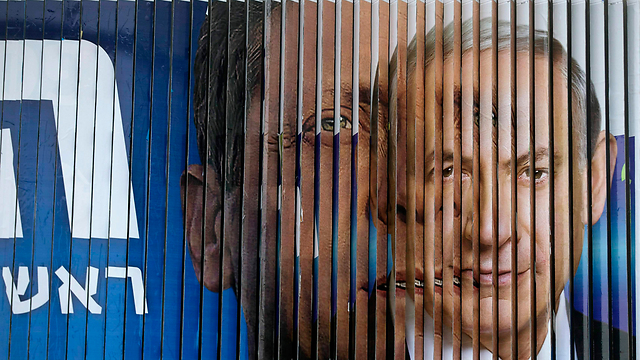
That's why Israel's next security-political leaders will have to provide a full and comprehensive response to all the aspects of the threat posed by the radical Shiite axis. This response must include four ingredients:
1. A preceding strike – The IDF's ability to deliver the first blow which will thwart any Iranian attempt to make a breakthrough towards a nuclear weapon, and at the same time to efficiently paralyze the rocket and missile threat from Lebanon and Syria. On the Iranian front, we are talking about a series of strikes which will not only disrupt the military nuclear project, but will also prevent its restoration for years. It is possible. The first blow strikes must be executed with conventional military means and through cyber warfare, so that Israel will not be accused of initiating a nuclear war and will maintain the international legitimacy to act out of self-defense.
2. Strategic deterrence – If it is proved that Iran managed to secretly produce a nuclear weapon, Israel should have a proven and reliable ability for a second blow. In other words, an ability to claim an unprecedented price from Iran and from its clients if it attacks Israel or if preparations for such an attack will be on the verge of execution. In this context, it should be mentioned that according to global media reports, Israel already has unconventional warheads and abilities which can turn Iran's cities and main infrastructure facilities into ruins. But that's not enough. In order to create reliable deterrence – conventional or unconventional – the Iranians and the world need to know that we have a reliable political leadership in Jerusalem which that will not hesitate to make use of all its available abilities if the situation becomes unbearable.
3. Intelligence, intelligence, intelligence – An important condition for dealing with and deterring the radical Shiite axis is an independent ability of Israel's intelligence community to detect, as early as possible, a decision made by the Iranian leadership to produce a nuclear weapon, and to provide a reliable warning to the leaders and allies in the world; to develop efficient collective and offensive cyber and provide tactical intelligence which will make it possible to attack in a way that will take the distant and close enemies out of balance as soon as possible.
4. Multi-layered defense – In order to complete the two offensive options, Israel must complete the establishment of the multi-layered defense system: A system of interception missiles and laser cannons which will be able to deal with all types of high-trajectory weapons from all directions, from mortar shells fired from Gaza to Shahab-3 missiles launched from Iran. The main part of this system, which will have six layers, should be operational towards the end of 2016. It won't provide us with perfect defense against the high-trajectory threat, but it will greatly minimize the losses and damage.
In need for America's goodwill
A significant part of the means and action plans against the radical Shiite axis already exists and is ready for use, but critical components are still missing. So in order for us to be able to sleep well at night, and so that the State of Israel's defense budget won't swallow most of the resources required for health, education and housing in the coming years, we need the American administration's goodwill.
In order to quickly complete the development of the David Sling's system, in order to be able to buy a stock of tens of thousands of interception missiles which will deal with the thousands of rockets and missiles that will be showered on us, in order to receive backing in the international arena if we attack in Iran or Lebanon first, in order to jointly develop cyber abilities which will overcome the Iranian defense systems, in order to get the help of the region's states which fear Iran or at least get them out of the way, in order to receive significant rescue aid – in order to achieve all this and more, we need a prime minister and a government in Jerusalem which are capable of reaching intimate cooperation and understandings with the president and administration in Washington. Not tomorrow – today.
Between Gaza and Ramallah
The second most serious cluster of threats is the one posed by the four areas of conflict with the Palestinians:
1. Gaza – If there will be no dramatic development in the coming months in the effort to rebuild the Strip and its economy, we must be prepared for another round of fighting with Hamas, more or less in the outline of the previous round but with a greater number of mortar shells and attempts to infiltrate our territory from the sea, from the land and from underground.
2. Jerusalem, Judea and Samaria – The fuel fumes in the air are getting thicker as a result of the past summer's events, Palestinian President Mahmoud Abbas' diplomatic offensive on Israel, the Israeli response (freezing tax funds, cutting the electricity supply) which is aggravating the economic situation in the West Bank, and the stalemate in the peace process. Because of all this, there is a real possibility of a major flare-up of violent riots and popular terror across Judea and Samaria this year.
3. The international arena – Another area of conflict is the diplomatic intifada which Abbas and his people are waging in the international arena. This "soft" offensive has already led to difficult results: It is deepening Israel's diplomatic isolation and providing ammunition to the de-legitimization campaign against us, it is creating an illusion among the Palestinians that they will be able to get Israel to withdraw to the 1967 borders without any concessions on their side, and it is fanning the flames which already exist in the West Bank.
4. One state between the river and the sea – The fourth threat, which is as existential as an Iranian atom bomb, is the possibility of a merger between the populations of the State of Israel and the West Bank into one diplomatic entity between the Mediterranean Sea and the Jordan River – a binational state or a state for all its citizens, which will erase the character and identity of the State of Israel as the national home of the Jewish people, or turn it into an apartheid state. This issue has become a real and immediate threat recently, mainly because the current leaderships in Ramallah and in Jerusalem have no political desire or strength to reach a solution to the conflict through negotiations. So there is a real possibility that the current situation will become fixed.
The Islamic world
The third cluster of threats Israel must deal with is the Islamist-jihadist Sunni axis, mainly the Islamic State and Jabhat al-Nusra. For now, the threat posed by this axis is the least serious of all, although it is already active in Sinai and the Golan Heights. The reason is that the war on the Jewish state is third or fourth on the fanatic Sunni jihadists' list of priorities. Their main enemies are the Shiites and the existing Arab regimes.
Nonetheless, the Sunni jihadists are a serious potential danger because they could lead to the collapse of the regimes we have peace with – in Egypt and Jordan – and inherit them, and they could take over modern and long-range weapons and their operators, as they did in Syria, Iraq and Libya.
At the moment, it seems that the US-led coalition has managed to curb ISIS and Jabhat al-Nusra in Iraq and in Syria, and Israel is succeeding in not getting dragged into the great Sunni-Shiite conflict. But this battle is still going on, and we must prepare for the day or moment in which we will become the main target. On the Egyptian border it could happen at any minute. A border fence on the Jordanian border, similar to the one on the Egyptian border, is not too much to ask for.
International isolation
The State of Israel already knows what it takes to deal militarily with the three clusters of threats it is facing. The IDF must be built and equipped to deal with the entire spectrum of threats at once and on at least two active fronts. For this purpose, the next cabinet must finally approve a multi-year work and purchase plan and resume the intimate and intensive dialogue with the current American administration.
Another urgent security task is to get us out of the isolation in the international arena in general, and particularly the status of the leprous country which is becoming fixated in Europe. In a global world, in order to efficiently use military and economic means against rivals, even super powers need global legitimacy and cooperation with other countries, as small and weak as they may be. For example, the US in its war against ISIS, or the European Union against Russian President Vladimir Putin on the Ukrainian issue. All the more so when it comes to Israel.
The situation at the moment is that this support is wearing out because of the differences of opinion between Israel and most of the Western democracies in regards to the Israeli-Palestinian conflict. It doesn’t matter who's right. The truth is that Abbas is the one who is currently torpedoing any agreement based on a fair compromise. But surprisingly, the global public opinion is putting the blame on Israel. Why? Because when there appears to be some kind of progress in the dialogue with the Palestinians, Prime Minister Benjamin Netanyahu's natural political partners work to torpedo it by declaring building initiatives in the settlements. These are mostly recycled and empty declarations, but their poisonous action limits the legitimacy we receive from the world to use the IDF's full force for self-defense.
During Operation Protective Edge, for example, Israel agreed to the frequent ceasefires suggested by the Egyptians only because of the need to gain international legitimacy. When Israel is diplomatically isolated, it is also exposed to pressures and harmful decisions initiated by Abbas in the UN and in other international institutions.
One doesn’t have to be a strategist or a statesman with exceptional skills to estimate that our security can be improved relatively easily. The first and most important step is to declare a construction freeze in the isolated settlements located outside the large settlement blocs in Judea and Samaria. Such a step will also delay the materialization of the danger of becoming a binational or apartheid state.
A second step is releasing the Palestinian tax funds which were frozen by Israel. A third step is carrying out the fourth stage of the Palestinian prisoner release which Israel committed to before the peace talks reached a dead end. A number of elderly Fatah members who return to the streets of Ramallah will not jeopardize our security. On the other hand, it will serve as proof that the new government in Israel is serious in its intention to clear the air and resume the negotiations with the Palestinians on a more realistic basis than in the past.
Another step is offering political and practical Israeli aid for Gaza's reconstruction. This is already taking place, but it must be increased – including making an effort to convince the Egyptians to open the Rafah crossing – and easing restrictions in various other ways. In exchange, the next Israeli government must demand that Abbas freeze the "diplomatic intifada" he initiated and immediately return to the negotiating table without any preconditions.
Even if the Israeli gestures fail to achieve the desired effect on Abbas, and only affect the Americans and the European in the right way – that's enough. I will vote for whoever I believe has a chance of carrying out at least some of these steps. In the Israeli electoral-coalitional reality, I may be disappointed, but I will at least know that my vote was levelheaded and responsible.










